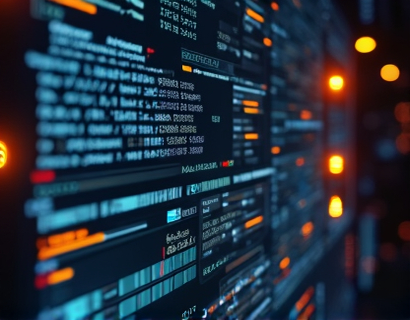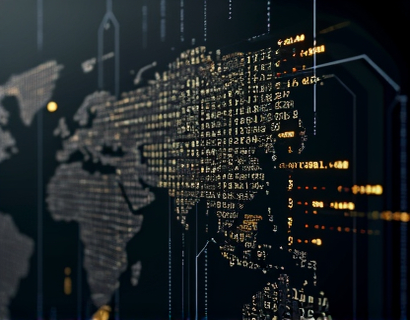The Intersection of AI and Crypto: Transforming Digital Finance
The integration of artificial intelligence (AI) with cryptocurrency is revolutionizing the landscape of digital finance. This synergy is not just a trend but a fundamental shift in how financial services are delivered, managed, and interacted with. As we delve into this topic, it's essential to understand the core components of both AI and cryptocurrency and how their convergence is paving the way for a more efficient, secure, and user-friendly financial ecosystem.
Understanding AI in Finance
Artificial intelligence, defined as the simulation of human intelligence processes by machines, particularly computer systems, is increasingly becoming a cornerstone of modern financial services. AI encompasses various technologies such as machine learning, natural language processing, and predictive analytics. In the context of finance, AI is used to automate complex tasks, analyze vast amounts of data, and provide insights that were previously unattainable.
One of the primary applications of AI in finance is in risk management. AI algorithms can process and analyze large datasets to identify patterns and predict potential risks. This capability is crucial in the crypto space, where market volatility and the lack of traditional regulatory frameworks make risk assessment challenging. By leveraging AI, financial institutions and crypto platforms can better manage and mitigate risks, ensuring a more stable and secure environment for users.
Cryptocurrency: A Brief Overview
Cryptocurrency, a digital or virtual currency that uses cryptography for security, operates on a decentralized network known as blockchain. Bitcoin, launched in 2009, was the first and most well-known cryptocurrency. Since then, thousands of alternative cryptocurrencies, or altcoins, have emerged, each with unique features and use cases. Cryptocurrencies offer several advantages over traditional fiat currencies, including lower transaction costs, faster processing times, and enhanced security through decentralization.
The decentralized nature of cryptocurrencies means that they are not controlled by any single entity, reducing the risk of censorship and fraud. However, this decentralization also introduces challenges, such as regulatory uncertainty and the need for robust security measures. AI can play a pivotal role in addressing these challenges by providing advanced solutions for compliance, security, and user experience.
AI-Driven Trading and Investment
One of the most exciting areas where AI and cryptocurrency intersect is in trading and investment. AI algorithms can analyze market data, news feeds, and social media sentiment to make informed trading decisions. These algorithms, often referred to as algorithmic traders, can execute trades at high speeds and with precision, outperforming human traders in many scenarios.
For individual investors, AI-powered trading platforms offer a way to participate in the crypto market without extensive knowledge or experience. These platforms use machine learning to adapt to market conditions and optimize trading strategies over time. By leveraging AI, users can gain access to sophisticated trading tools and insights that were previously only available to professional traders.
Enhanced Market Predictions
AI's ability to process and analyze vast amounts of data makes it an invaluable tool for market prediction. By examining historical price data, trading volumes, and other relevant factors, AI models can identify trends and patterns that human analysts might miss. This capability is particularly useful in the crypto market, which is known for its volatility and rapid price movements.
Predictive analytics powered by AI can help investors make more informed decisions, reducing the risk of costly mistakes. For example, AI can forecast price movements based on technical indicators and market sentiment, providing users with actionable insights. Additionally, AI can monitor real-time market data to adjust strategies dynamically, ensuring that investments remain aligned with market conditions.
Security and Compliance
Security is a paramount concern in the crypto space, and AI offers robust solutions to enhance the safety of digital assets. AI-driven security systems can detect and respond to threats in real-time, identifying suspicious activities and potential vulnerabilities. Machine learning algorithms can be trained to recognize patterns associated with fraudulent behavior, such as phishing attacks or unauthorized access attempts.
Moreover, AI can assist in compliance with regulatory requirements, which are increasingly important as governments around the world begin to recognize and regulate cryptocurrencies. AI can help ensure that transactions adhere to KYC (Know Your Customer) and AML (Anti-Money Laundering) regulations by automating the verification process and flagging suspicious activities. This not only protects users but also helps crypto platforms avoid legal issues and reputational damage.
Smart Contracts and AI
Smart contracts, self-executing contracts with the terms directly written into code, are another area where AI can add significant value. AI can enhance the functionality of smart contracts by incorporating machine learning algorithms that allow for more complex and adaptive contract behaviors. For instance, AI can enable smart contracts to make decisions based on real-time data, such as adjusting payment terms based on market conditions or automatically executing transactions when certain conditions are met.
This integration of AI and smart contracts can streamline various financial processes, from supply chain finance to decentralized finance (DeFi) applications. By automating and optimizing these processes, AI and smart contracts can reduce costs, increase efficiency, and enhance trust in decentralized systems.
User Experience and Accessibility
The combination of AI and cryptocurrency is not only transforming backend processes but also enhancing the user experience. AI-powered chatbots and virtual assistants can provide 24/7 customer support, answering queries and guiding users through complex financial operations. These AI-driven interfaces can understand natural language, making it easier for users to interact with crypto platforms without needing extensive technical knowledge.
Furthermore, AI can personalize the user experience by recommending products and services based on individual preferences and behavior. For example, an AI system can analyze a user's trading history and suggest suitable investment opportunities or alert them to potential risks in their portfolio. This level of personalization can make the crypto space more accessible and user-friendly, attracting a broader audience.
Decentralized AI Models
As AI becomes more integral to the crypto ecosystem, the development of decentralized AI models is gaining traction. Decentralized AI leverages blockchain technology to create AI models that are transparent, secure, and resistant to censorship. This approach ensures that AI algorithms are not controlled by a single entity, promoting fairness and trust.
Decentralized AI models can be particularly beneficial in the crypto space, where data privacy and security are critical. By distributing AI computations across a network of nodes, these models can process and analyze data without compromising user privacy. This decentralized approach also enhances the robustness of AI systems, as they are less vulnerable to attacks and data breaches.
Challenges and Considerations
While the integration of AI and cryptocurrency offers numerous benefits, it also presents several challenges that need to be addressed. One of the primary concerns is the computational power required for AI algorithms, especially those involving deep learning. Mining cryptocurrencies and running AI models both require significant energy, raising environmental concerns.
To mitigate this, the industry is exploring more energy-efficient solutions, such as using renewable energy sources and developing less resource-intensive AI models. Additionally, the regulatory landscape for both AI and cryptocurrency is still evolving, and platforms must navigate these uncertainties to ensure compliance and maintain user trust.
Ethical Considerations
Ethics play a crucial role in the development and deployment of AI in the crypto space. Issues such as algorithmic bias, data privacy, and the potential for AI to be used in malicious activities must be carefully considered. Developers and platforms must prioritize ethical practices, ensuring that AI systems are transparent, fair, and secure.
For instance, AI models used in trading and investment should be designed to avoid biases that could lead to unfair market practices. Similarly, AI-driven security systems must be robust and reliable to protect user assets effectively. By adhering to ethical standards, the industry can build a foundation of trust and credibility.
Future Prospects
The future of AI and cryptocurrency is promising, with ongoing advancements likely to further revolutionize digital finance. As AI technologies continue to evolve, we can expect more sophisticated and integrated solutions that enhance the efficiency, security, and accessibility of crypto platforms.
One area of future development is the integration of AI with other emerging technologies, such as quantum computing and the Internet of Things (IoT). Quantum computing, with its ability to process complex calculations at unprecedented speeds, could significantly enhance AI's capabilities in finance. IoT devices can provide real-time data inputs, enabling AI systems to make more accurate and timely decisions.
Another exciting prospect is the expansion of decentralized finance (DeFi) platforms, which leverage AI to create more inclusive and accessible financial services. DeFi has the potential to democratize finance, providing opportunities to underserved populations and fostering financial inclusion on a global scale.
Conclusion
The synergy between AI and cryptocurrency is transforming the financial landscape, offering innovative solutions that enhance efficiency, security, and user experience. As these technologies continue to evolve, they will play an increasingly vital role in shaping the future of digital finance. For tech enthusiasts and innovators, the intersection of AI and crypto represents a fertile ground for exploration and opportunity, paving the way for a more intelligent and resilient financial ecosystem.










































